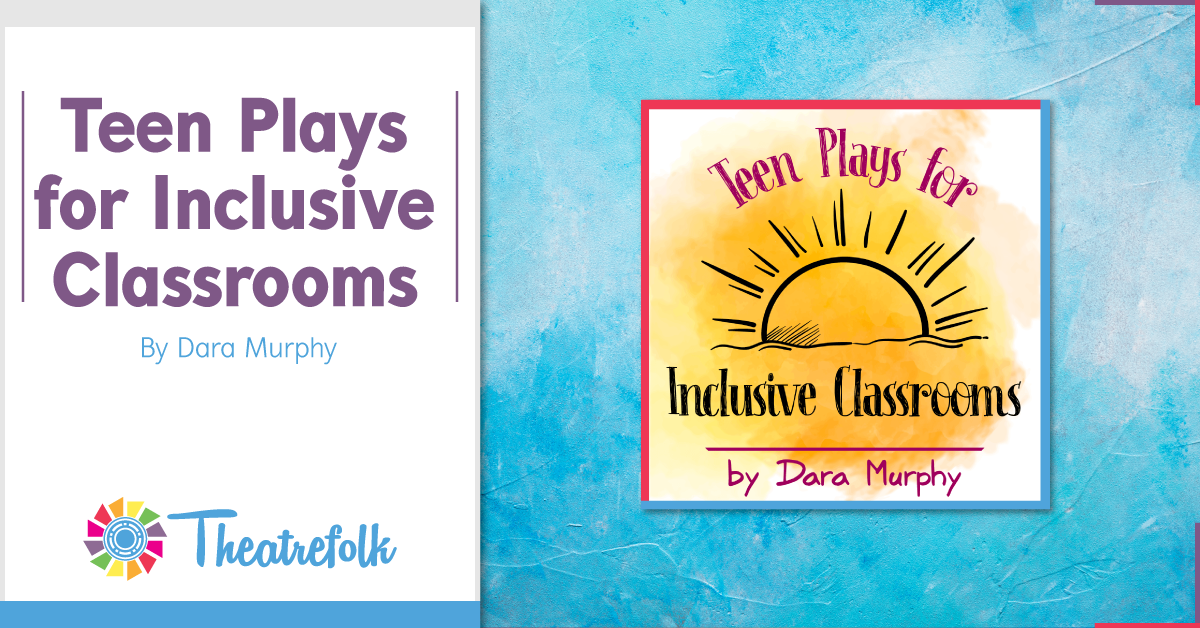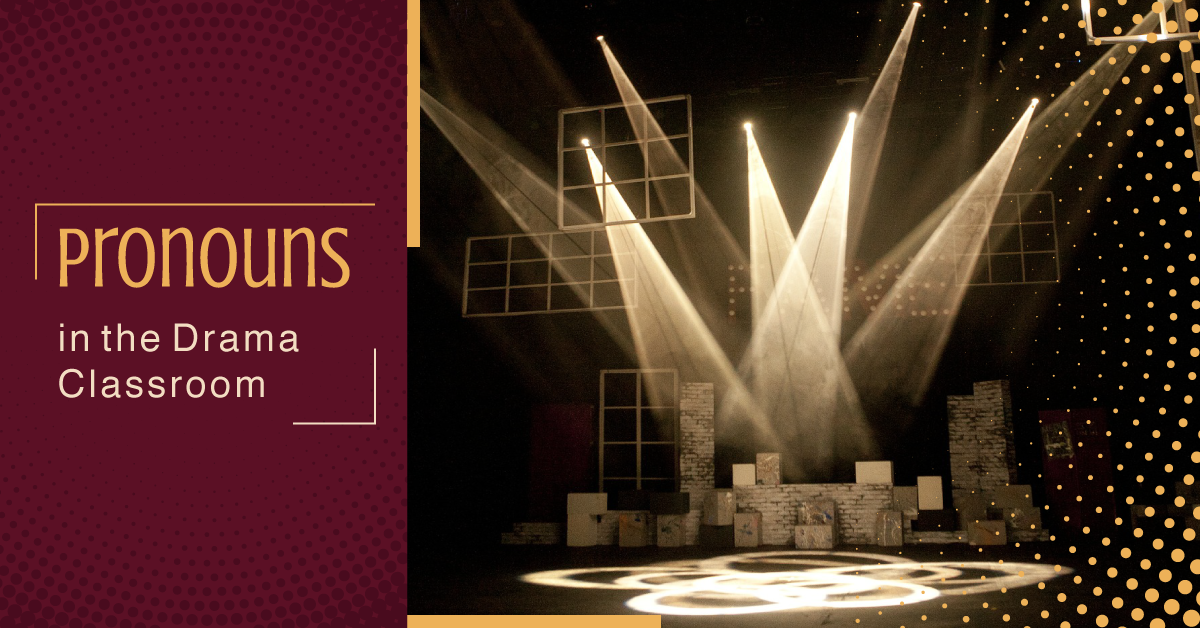Teen Plays for Inclusive Classrooms
As drama educators, we have the opportunity to instill a love and appreciation of theatre for all students. Teen Plays for Inclusive Classrooms by Dara Murphy is a fantastic resource for classrooms that are made up of a wide variety of talents and abilities. Read on to learn more about Dara’s tips to ensure a successful acting experience for your entire classroom.
Teen Plays for Inclusive Classrooms contains two fun and simple plays for teens that were originally performed by teens with developmental disabilities, but they could be useful for many groups. Perhaps you are looking for a play for first time actors, or for your ESL group, or you have a student in your class who’s deserving of a lead role but, for whatever reason, they need simpler material in order to be successful. This leads us to inclusive classrooms.
Most classrooms are full of diversity, with a wide variety of talents and abilities. As a teacher, it seems obvious to pick material that suits the
academic level of the majority, and then to adapt that material for any outliers. In the arts, this can lead to certain students always having to
“stand in the back,” or “lip sync along to the song.”
So, I challenge you to first, when you are designing your units, think of the students who need more support. Design a performance unit with them in mind. It’s going to force you to be creative about how they will learn the material and how they will express what they’ve learned. Then you will have lots of good ideas that you can pull through to your other learners.
Plays like the ones in this book can be another tool in your kit. Although the language is uncomplicated, the acting doesn’t have to be! These plays can give advanced learners room to explore other drama techniques such as movement, masks, melodrama, and directing… perhaps they could even perform the whole play through mime.
People with disabilities can be fantastic actors. When given the opportunity, they will wow audiences with their authenticity and energy. In return, you will likely see these students grow and develop their confidence, social skills, and communication abilities. This would be a great outcome for your inclusive classroom!
Some Tips
Here are some tips on giving these students a successful acting experience:
Starmaker School
This is a fun play to watch and perform. Because it contains music and dance, it includes students with a variety of talents and abilities.
For example, a nonverbal student can dance in the Dance Crew or play an instrument in the Music Crew. Also, practicing the different musical numbers breaks up the rehearsal so you don’t always have to focus on acting and memorizing. When we performed this play, we collaborated with the music and dance teachers, and we made sure to choose cool songs that the students loved.
The Forest Creatures
This play is enjoyable for older students who like to scare their audiences. Don’t be shy; use scary music, sets, costumes, and make-up! The Forest Creatures has some non-speaking roles, as well as some more challenging roles. Although there’s no music or dance in this play, the variety of characters allow for more character exploration. How will the forest creatures move and make sounds? Is Evil Eye really evil? Who is Cal? How do the campers change when they are “zapped?” Also, have fun with the final fight scene at the end. Take your time with the choreography and make sure that everyone is safe.
The most difficult part of this play is the entrances and exits. We found it useful to have volunteers in the wings to help the students enter. We also had a fellow teacher acting as one of the campers (Connie). This teacher was able to help lead the students who needed more assistance.
Learning Lines
Many students, regardless of their reading level, enjoy having a script and highlighting their lines. A script means that they are part of the team! Often, when actors are introduced to a new play, the script is handed out and the cast does a group read-through. This can be discouraging for those students who struggle with reading. To help with this, you can give the students their scripts beforehand so they can pre-read it. You can also run the read-through by chunking the play into sections. Read a section to them first, while they follow along. Discuss what has happened, and then have the actors read or repeat it.
Learning and memorizing lines might be difficult for many students. When we rehearsed these plays, we learned the lines by rote, working on one small section at a time. It’s still valuable, however, to give students a sense of responsibility for learning their own lines. Teach them how to memorize their lines at home by using a friend or a recording, and encourage them to do so. Also, it’s important to make sure that students understand the words that they are saying. Students should not be saying lines that they don’t understand. Don’t be surprised if a student memorizes all of their lines with ease, and perhaps even all of the lines in the play! Our students have amazing abilities.
In the end, however, you might need to have a line whisperer during the performance. That’s okay! But during rehearsals, don’t teach the actors to rely on that person. It’s okay to let them experience a missed line. Finally, everyone is different when it comes to learning and saying lines. Some words might be hard to pronounce, some lines might be too complicated, and some lines might be too simple. Please feel free to edit the lines in these plays as needed and adapt the plays to fit with your group.
Stage Directions
Sometimes knowing where and when to move can be a struggle for students. When you are starting to block the scenes, look at how and where your students naturally want to move. Your students’ unique and creative ideas are gifts to your rehearsal process. If you see that a student is having trouble with stage directions, have them follow another actor. Their characters can be friends!
Our groups can’t rehearse on a real stage, so we found it useful to mark out a stage on the floor with pylons. Almost every rehearsal we reminded the students where the entrances were, and we demonstrated how to face the audience. We then taught the students a “group position.” This was a place where everyone stands when the whole group is onstage. We practiced entering and standing in that position.
For certain students, you might want to create a visual script. For example, in Starmaker School, after Eggman says “check out the dance
group” a student has to walk to their mark and start dancing. A visual script for that section could have a picture of Eggman with a speech bubble that says “check out the dance group,” then a picture of walking, then a picture of where you want them to walk, and then a picture of dancing. A visual script would have to be tailor made for the student and simplified so that it shows only what that student is doing or reacting to.
Lastly, it’s useful to have someone on both wings to help with entrances and exits. That person can also whisper helpful reminders to students before they enter, such as what scene they’re on, where they should stand, and what their first line is going to be.
Rehearsals
Here are a few final rehearsal tips:
- Students love warm-ups, but be careful when selecting games. Some of the popular “calling around the circle” games are tricky for students with hearing impairments, and tongue-twister type games, like Zip Zap Zop, can be very challenging!
- Don’t give too many directions at once and be encouraging and positive. It might take a while to learn everything, so you need to keep
the motivation up. - Give breaks so your actors can relax and socialize with one another.
- Miming or imagining a prop or set piece can be difficult. It’s much easier to have the actual, tangible item.
- Music can be a useful for cues, and sometimes I even stand by the stage with a guitar. For example, when the music sounds like this, exit, when the music sounds like that, march around. Keep moving until the music stops!
- Putting on a play might be a new experience for some of your students. Be sure to leave time to answer their many questions. It’s valuable for them to understand your expectations and your routines.
I hope these plays and these tips are useful for you. We had a lot of fun performing these plays, and I hope you do too. Please help make the
theatre a fantastic experience for all actors. Everyone deserves a chance to be in the spotlight!
Click here to learn more and read free sample pages of Teen Plays for Inclusive Classrooms



